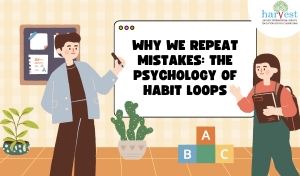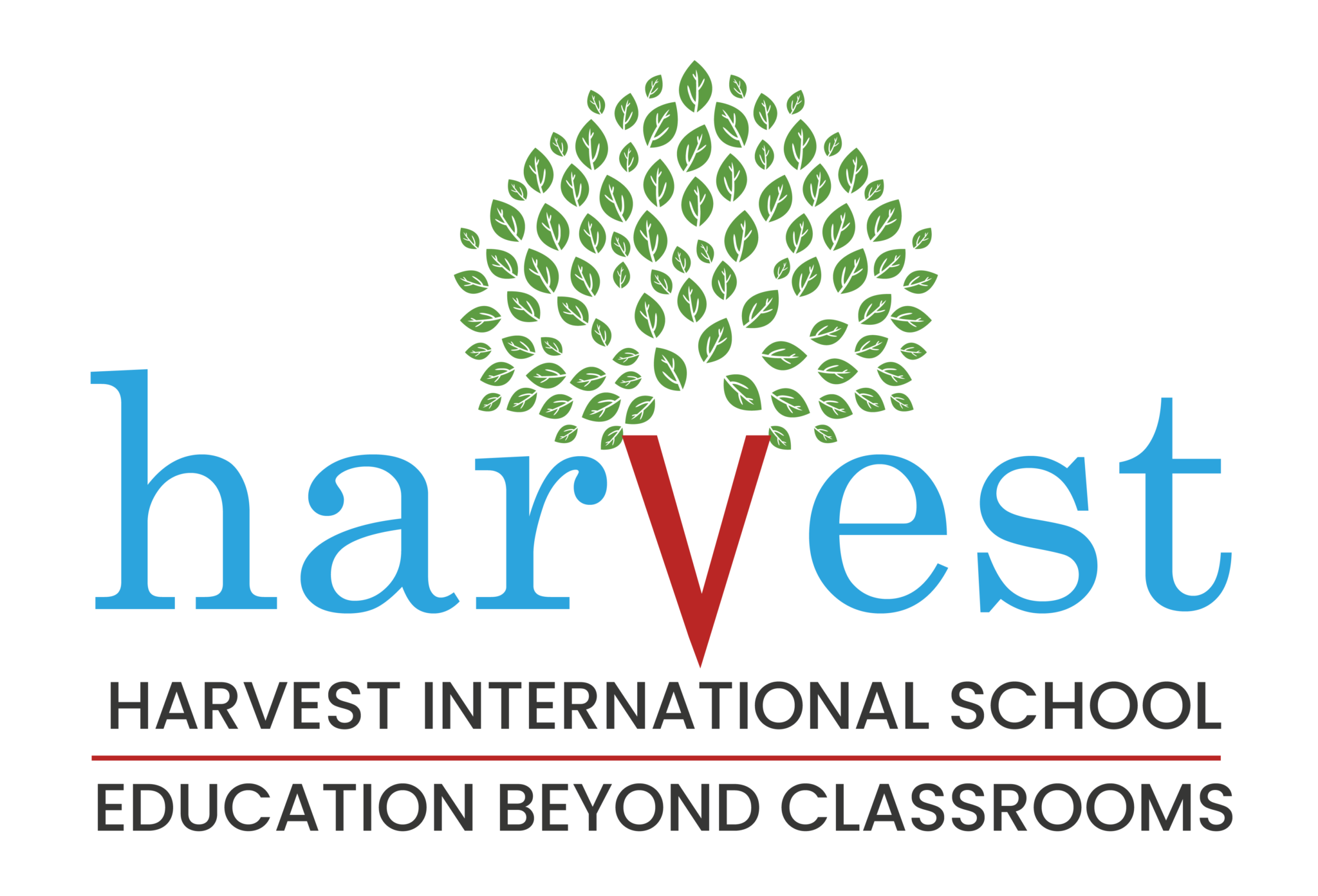Why We Repeat Mistakes: The Psychology of Habit Loops
- Why Students Repeat Mistakes
- Best schools in Electronic City
- Best CBSE schools in Bangalore
- Harvest International School
- Top international schools in Bangalore


Why Students Repeat Mistakes
Every one of us has, at some point, found ourselves repeating the same mistake—whether it’s procrastinating on assignments, falling into unproductive routines, or reacting impulsively in difficult situations. Despite knowing better, we often find ourselves in a cycle of repetitive behaviors. Why does this happen?
At Harvest International School, we are deeply invested in helping our students understand not only what they learn but why they behave the way they do. As one of the best schools in Electronic City, we believe that understanding the root of human behavior empowers students to grow, change, and succeed. One of the most critical concepts in behavioral psychology that sheds light on this topic is the habit loop—a powerful framework that helps explain why we keep repeating certain behaviors, including our mistakes.
Let’s explore the psychology of habit loops and how students and educators can work together to break unproductive cycles.
Understanding the Habit Loop
The habit loop is a concept popularized by Charles Duhigg in his book The Power of Habit. According to Duhigg, habits consist of three key elements:
- Cue – a trigger that signals the brain to initiate a behavior.
- Routine – the behavior or action itself.
- Reward – the benefit we get from performing the behavior.
Over time, these three elements form a loop that runs automatically, often without conscious thought. For example, a student might feel stress (cue), scroll through social media to distract themselves (routine), and feel temporary relief (reward). The brain records this loop, making it more likely the student will repeat it the next time they feel stressed—even if they know it’s not helping in the long run.
At Harvest, one of the best CBSE schools in Bangalore, we believe in educating students about such psychological frameworks so they can recognize their patterns and take control of their behaviors.
Why We Keep Repeating Mistakes
Repetition of mistakes isn’t usually a sign of laziness or lack of intelligence—it often stems from deeply ingrained habit loops. Here’s why it happens:
1. Familiarity Feels Safe
The brain is wired to seek comfort and efficiency. Habits—good or bad—are energy-saving mechanisms. Once a loop is established, it becomes the brain’s default mode of operation. This is why students may continue submitting assignments late or avoiding studying, even when they know the consequences.
2. Short-Term Rewards Override Long-Term Goals
The immediate reward from a bad habit often feels more satisfying than the delayed benefit of a better choice. For instance, skipping homework might provide instant relaxation, while doing it demands effort without instant gratification.
As educators at one of the best international schools in Electronic City, we integrate emotional and behavioral literacy into our curriculum so that students understand how to delay gratification and make choices aligned with their long-term goals.
3. Lack of Awareness
Most mistakes are repeated not because students want to fail, but because they aren’t fully aware of what triggers the behavior. Identifying the cue is often the first step to breaking the loop.
This is why self-reflection and mindfulness practices are encouraged at Harvest, where we strive to remain one of the good CBSE schools in Sarjapur road Bangalore by supporting the emotional and mental growth of our students, not just academic performance.
Case Study: Procrastination in Students
Take the example of procrastination—a mistake students commonly repeat. The habit loop looks like this:
- Cue: The sight of a complex assignment.
- Routine: Avoidance (e.g., watching videos or chatting with friends).
- Reward: Temporary relief from anxiety.
Over time, this loop reinforces avoidance, even though it leads to stress later. At Harvest International School, we tackle this through structured learning environments, mentorship programs, and time-management workshops to help students build productive routines.
As one of the best schools in Electronic City, our goal is not just to help students complete tasks, but to equip them with lifelong skills to recognize and replace negative habits.
Breaking the Habit Loop: From Mistake to Mastery
Changing habits and learning from mistakes is entirely possible. Here’s how we support students in making lasting changes:
1. Identifying the Cue
Students are taught to recognize their triggers. Is it boredom, fear of failure, peer pressure? Understanding what sets off the behavior is the first step to change.
For example, in a workshop at Harvest, students reflected on their personal triggers through journaling and peer discussions. This process of self-discovery, emphasized in one of the best CBSE schools in Bangalore, helps young minds make conscious choices.
2. Replacing the Routine
Once the cue is identified, we guide students to replace the harmful routine with a positive one. Instead of scrolling through social media when stressed, students might take a short walk, do deep breathing, or talk to a mentor.
Our approach emphasizes developing healthier routines through mental health awareness campaigns and one-on-one counseling support.
3. Reinforcing New Rewards
Celebrating progress—no matter how small—is key. When a student finishes an assignment ahead of time, we encourage positive reinforcement, whether through verbal praise, peer recognition, or classroom shoutouts.
This culture of encouragement and emotional validation is why Harvest is known as one of the good CBSE schools in Sarjapur road Bangalore, where students feel safe to try, fail, and try again without judgment.
How Schools Can Support Better Habits
The role of schools is pivotal in shaping habits during the foundational years of a child’s life. Here’s how we create an environment that helps students replace mistake-prone loops with productive ones:
1. Structured Learning and Routines
Predictable schedules, goal-setting, and regular feedback create a sense of stability and reduce the likelihood of impulsive behaviors. At Harvest, we use daily planners, academic calendars, and peer-study models to instill discipline.
2. Social and Emotional Learning (SEL)
Incorporating SEL into daily lessons helps students recognize their emotions, manage their behavior, and build better interpersonal relationships. Topics like self-awareness, impulse control, and empathy are taught through real-life scenarios, role-play, and reflective writing.
3. Mentorship and Peer Support
Mentorship programs allow older students to share their journey, helping younger students navigate challenges. Peer discussions also reduce feelings of isolation, letting students know they are not alone in making mistakes.
These systems form the backbone of the community at Harvest, making it one of the good CBSE schools in Sarjapur road Bangalore where growth is a shared journey.
Learning to Learn from Mistakes
Mistakes, when used as learning opportunities, become powerful tools for growth. At Harvest International School, we teach students that falling down is not failure—it’s feedback. Understanding the psychology behind mistakes helps students feel empowered to break the loop.
As one of the best international schools in Electronic City, we introduce reflective exercises like weekly reviews, teacher-student feedback meetings, and mindfulness check-ins, so students can track patterns and progress.
Conclusion: Choosing Growth Over Repetition
Habit loops can either trap us or transform us. By understanding the psychology behind repeated mistakes, students can learn to take charge of their behaviors, build healthier routines, and achieve lasting success.
At Harvest International School, we don’t just teach students what to think—we teach them how to observe their thinking, recognize their habits, and make empowered choices. Whether you’re looking for one of the best CBSE schools in Bangalore, a nurturing environment among the best international schools in Electronic City, or simply one of the good CBSE schools in Sarjapur road Bangalore that truly understands student psychology—Harvest is the place where transformation begins.
Mistakes are not the enemy—they are the starting point for growth. At Harvest, we’re here to walk with every student, every step of the way.
